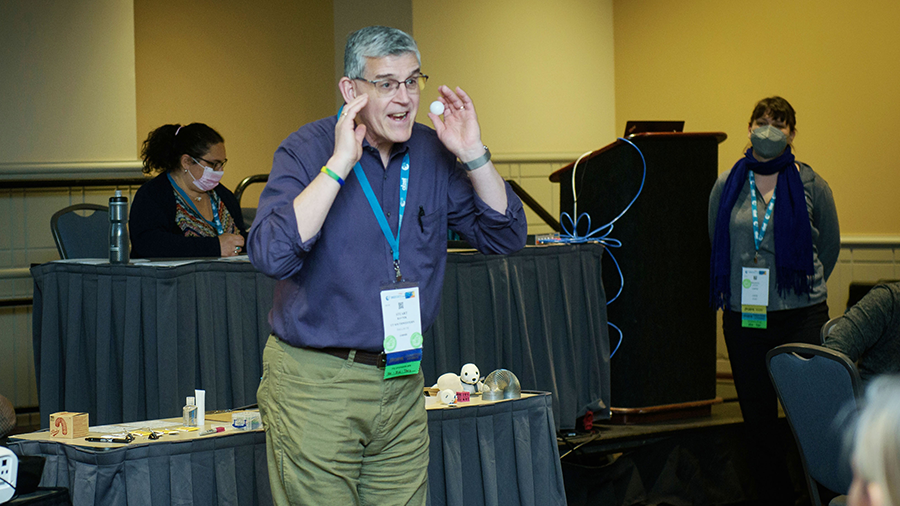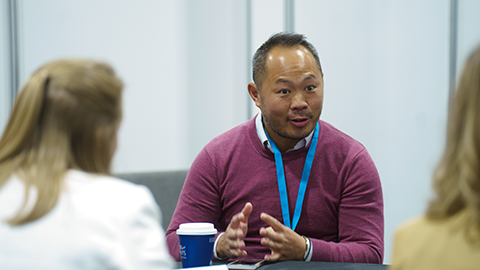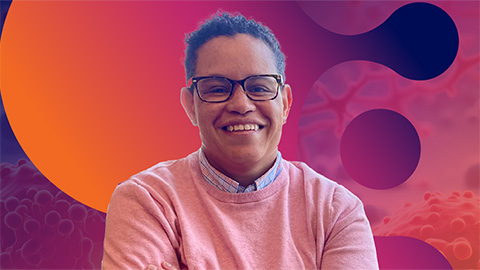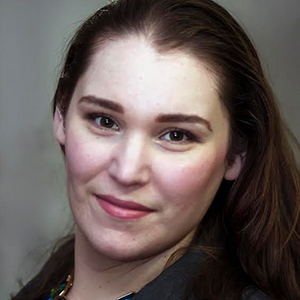Call for proposals: Essential, mission-driven programming at Discover BMB
Scientists are lifelong learners. While scientific meetings are a one-stop shop for learning about research, they also are where we learn how to become more competitive in the workforce, how to create more inclusive learning and professional environments, and how to foster public trust in scientists and the scientific process. In other words, meetings are where we go to learn how to become better scientists, better contributors to the scientific community and better members of society at large.
In March, the American Society for Biochemistry and Molecular Biology will hold its first stand-alone annual meeting in many years. We’re calling the meeting Discover BMB, and, for reasons I’ll explain below, it will offer daily programming dedicated to careers and professional development as well as best practices for science outreach and diversity, equity, accessibility and inclusion.
Importantly, all of that programming will be designed by members. And, to be clear, this is a call for proposals.
Standing room only
There never seems to be quite enough time in a scientific conference to see everything you want to. Between catching the latest science and catching up with old colleagues, the days can feel both long and short, invigorating and exhausting.
For many years, the ASBMB held its annual meeting at the Experimental Biology conference, at which attendees could tap into a number of sessions hosted by the five host societies. Attendees also could take advantage of the short talks at EB Career Central in the exhibit hall.
Amid the din of exhibitors showing off the latest products and attendees presenting their posters, flocks of attendees leaned in to listen to talks about the art of the interview and about how to take those first steps into a science policy career.
Each time I walked by EB Career Central in Philadelphia earlier this year, I saw attendees sitting on the floor when chairs were at a premium, and I was reminded of just how eager attendees are to learn, to grow their skills, and to think about what’s next for both their science and their careers.

Don’t take my word for it
While planning for #DiscoverBMB, we invited our 2022 graduate student and postdoc travel awardees to weigh in on what the ideal conference would look like to them. The themes we heard from them were “networking” and “learning new things.”
So what, you might ask, are those new things? Certainly, some of those are science, but others are skills and career advice.
Nearly all the people we asked indicated they typically attend at least a couple of career-development sessions when they go to a meeting, and many said they’d like a meeting that offers career-development programming daily.
They mentioned, for example, such topics as becoming a better mentor, funding their research, sharing science on social media and engaging in science outreach.
Travel awardees also shared a desire to learn more about careers — particularly careers outside of academia — and about career decision-making, career transitions and career outcomes.

Aligned with our mission
When planning our annual meeting, we must ensure that the programming decisions we make are aligned with the ASBMB mission, which is “to advance the science of biochemistry and molecular biology and to promote the understanding of the molecular nature of life processes.”
One of the ways the society advances the field is by promoting diversity, equity, accessibility and inclusion in the scientific workforce. Earlier this week, we published a set of core values relating to DEAI, and in it we vowed, among other things, to support members “in their DEAI efforts at their respective institutions and out in the world.”

At #DiscoverBMB, we’d like to offer lots of sessions that will arm our members with strategies and practical advice for achieving their DEAI goals.
Back to the mission statement: The second part quoted above is about science education and literacy. The ASBMB has an increasingly robust science communication program, but it’s what our members do in their communities that matters most. With politicization of science and misinformation on the rise with devastating consequences, we need an army of scientists doing this important outreach work.
It’s more important than ever to make science accessible to the public and put a human face on scientists, which is why we’d like to provide hands-on workshops and other sessions that will equip members with the skills and tactics they need to make a real impact locally.
Here’s where you come in
Many members of the society have expertise in transferrable skills that give scientists an edge in the job market and on the career ladder. Our members have compelling stories about their professional journeys, which form the heart of an effective career panel. Our members are courageous leaders in the DEAI space and have experience creatively communicating science to the public. In all, our members have so much to share, and that’s why I’m writing this today.
If you would like to organize a career-development, outreach or DEAI panel or workshop, I hope you will submit a proposal. The deadline is Aug. 15.
The relevant ASBMB committees will review submissions and create a robust program.
Think broadly and creatively about the types of content you’d like to share. Generally, your session may take one of two formats: panel or skill-building workshop. If you intend to propose a panel, you will need to tell us who might serve on the panel and how this format will support your key takeaways for the session. If you want to propose a skill-based workshop, you must include some sort of active-learning component.
Feel free to contact me if you have any questions, and thank you in advance for helping us meet the needs of our community.
Enjoy reading ASBMB Today?
Become a member to receive the print edition four times a year and the digital edition monthly.
Learn moreFeatured jobs
from the ASBMB career center
Get the latest from ASBMB Today
Enter your email address, and we’ll send you a weekly email with recent articles, interviews and more.
Latest in Careers
Careers highlights or most popular articles

Creating change in biochemistry education
Pamela Mertz will receive the ASBMB William C. Rose Award for Exemplary Contributions to Education at the ASBMB Annual Meeting, March 7-10 in Washington, D.C.

Trainee mentorship as immortality
Suzanne Barbour will receive the ASBMB Sustained Leadership Award at the ASBMB Annual Meeting, March 7-10 in Washington, D.C.

Upcoming opportunities
Join us Feb. 5! The monthly ASBMB Transcription Webinars aim to facilitate knowledge exchange and collaboration among researchers in the fields of transcription, chromatin and epigenetics.

Life in four dimensions: When biology outpaces the brain
Nobel laureate Eric Betzig will discuss his research on information transfer in biology from proteins to organisms at the 2026 ASBMB Annual Meeting.

Redefining excellence to drive equity and innovation
Donita Brady will receive the ASBMB Ruth Kirschstein Award for Maximizing Access in Science at the ASBMB Annual Meeting, March 7–10, just outside of Washington, D.C.

Upcoming opportunities
Calling all biochemistry and molecular biology educators! Share your teaching experiences and insights in ASBMB Today’s essay series. Submit your essay or pitch by Jan. 15, 2026.

